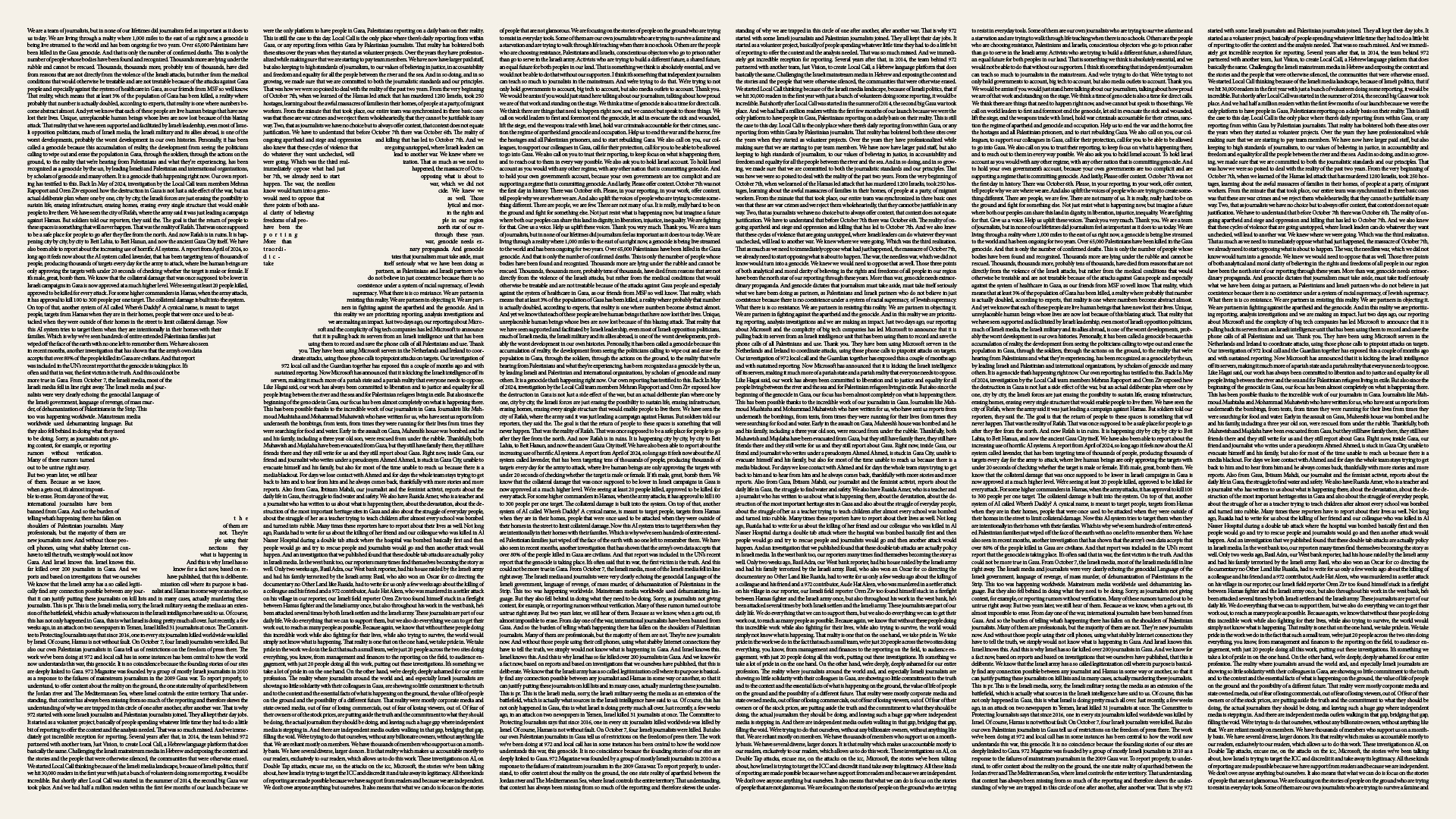With the ceasefire between Israel and Hamas being a reality, five journalists and media professionals share their perspectives on covering a war that has resulted in the highest number of journalist casualties in history. They assess the experience of the last two years and comment on the prospect of the next day –which has yet to come.
Translated by Evita Lykou
Illustration: Evgenios Kalofolias
“Bombing is still there, and people being killed and injured is still ongoing as we are speaking now,” said Rawan Damen, Director General of the nonprofit Arab Reporters for Investigative Journalism (ARIJ), in a WhatsApp voice message on the afternoon of October 9 from Jordan. “The people in Gaza are optimistic. They hope that the genocide will end,” she said in the same message, commenting on the news of the then upcoming ceasefire between Israel and Hamas.
Her words sounded like a natural extension of the phrase with which she had concluded her speech two weeks earlier in Athens while accepting the IJ4EU Impact Award for The Gaza Project, a collaborative research project presented at this year’s iMEdD International Journalism Forum: “This genocide cannot be accepted,” she said on September 26, with misty eyes to roaring applause. Speaking with iMEdD, the Palestinian director of ARIJ described the situation that journalists have been living and working in since the beginning of the war, two years ago, stating that journalists know 100% they are being targeted.
ARIJ was founded 20 years ago to support journalists throughout the Arab world. Since then, it has trained over 900 journalists in Gaza. Following October 7, 2023, the organization was called upon to provide journalists with necessary equipment and infrastructure.
If the ceasefire really happens, [journalists] should no longer be targeted, so they won’t face the real, horrific threat of being killed. Yet, starvation is still there. We need to see food and clean water coming in.
Rawab Damen, Director General of ARIJ
“In Gaza, it is a continuous challenge to have food for yourself, to have food for your family, to have a bathroom to use. There is no clean water to drink at all, nor internet or electricity to upload [your work]” she noted, in a discussion with iMEdD, in Athens. “If the ceasefire really happens, [journalists] should no longer be targeted, so they won’t face the real, horrific threat of being killed. Yet, starvation is still there. We need to see food and clean water coming in,” she added two weeks later amid the prospect of a ceasefire.
International media reported that on the morning of Sunday, October 12, trucks carrying humanitarian aid entered the Gaza Strip, while others formed queues at the border with Egypt.
According to figures released by the Committee to Protect Journalists (CPJ), “197 Palestinian journalists have been killed by Israel in Gaza since the start of the war”. The International Federation of Journalists (IFJ) has increased the number to at least 223 Palestinian journalists.
Rawan Damen made it clear why this happened: “Israel deliberately targets journalists to stop coverage, to stop all images, all videos, all information, all stories that verify the genocide and human rights violations in Gaza.”
Israel’s killing of journalists follows a pattern of silencing Palestinian media that stretches back to 1967
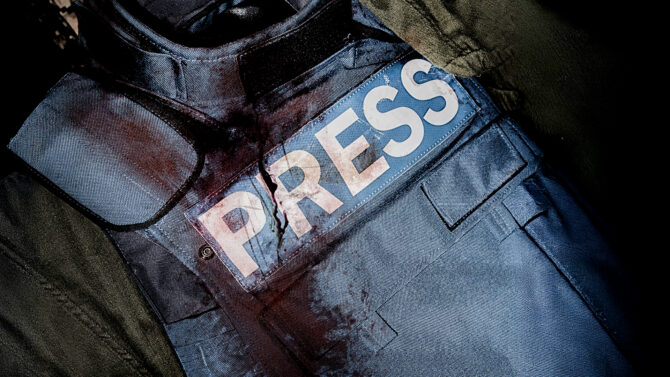
For The Conversation writes Maha Nassar, Associate Professor in the School of Middle Eastern and North African Studies, University of Arizona.
“These are our people, our stories, our lives”
In addition to Rowan Damen, the main stage of the iMEdD International Journalism Forum also featured Haggai Matar and Alaa Salama, the Executive Director and Audience Engagement Manager of +972 Magazine respectively.
On October 10, the first day of the ceasefire, Matar, who is back in Israel, says that many people asked him if the ceasefire would bring peace or a definitive solution to the Palestinian issue. “We’re not even close,” he comments during a telephone conversation. He considers the ceasefire and the return of hostages to Israel to be very important developments; however, he said that “to assume this will bring an end to violence and conflict is dangerous”, stressing that nothing has changed in terms of living conditions in Gaza.
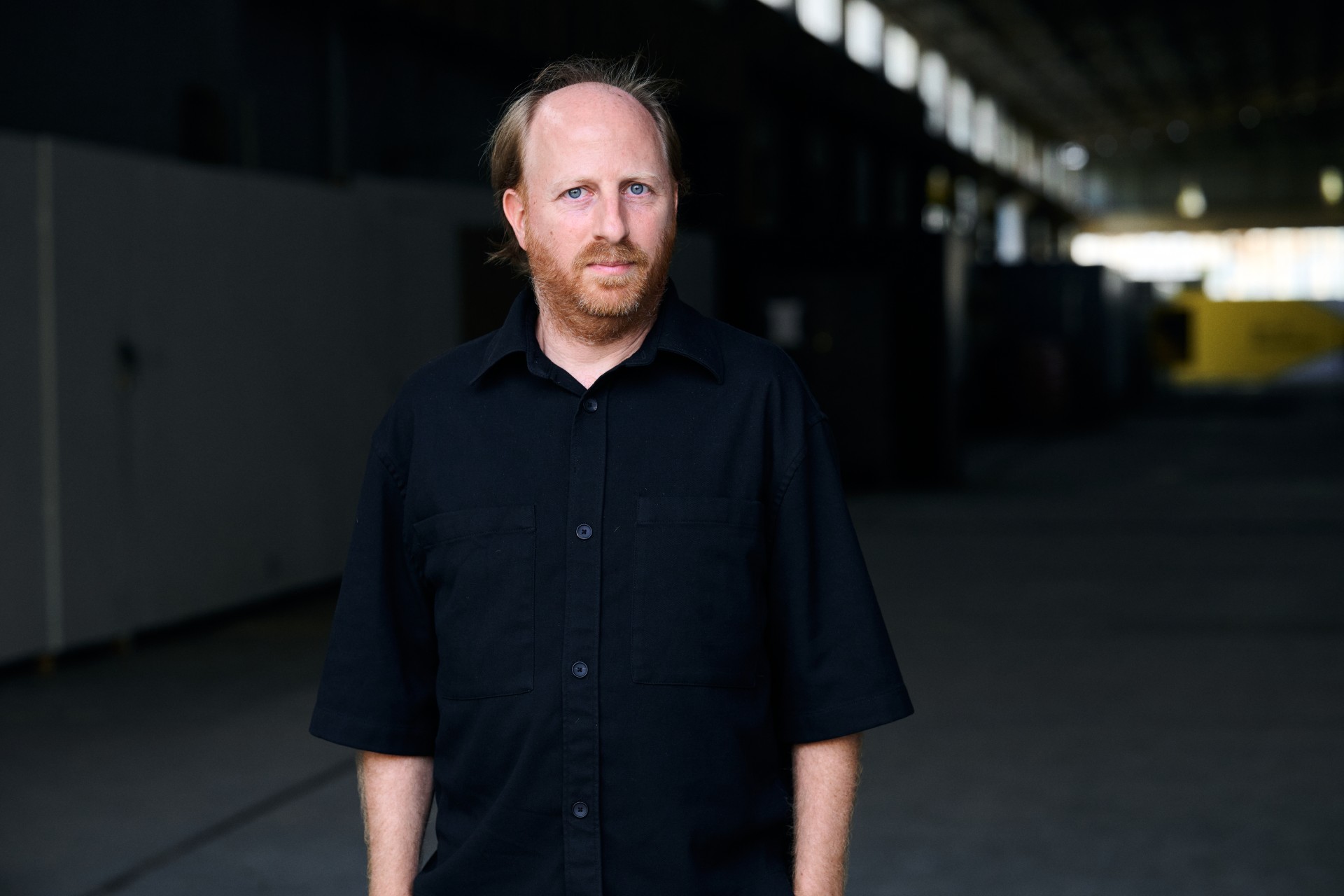
Directed by Matar, +972 Magazine is a unique online magazine in that it employs both Israeli and Palestinian journalists. It was founded in 2010 and publishes in English. Matar, who was previously imprisoned for two years for refusing to join the Israeli army, co-directs Local Call , a “sister” medium founded in 2014 that publishes in Hebrew.
“Our attempt to change the Israeli society from within is not working, is not enough. We need international pressure and accountability,” Haggai Matar told iMEdD, explaining the need for journalistic material in both languages.
Our attempt to change the Israeli society from within is not working, is not enough. We need international pressure and accountability.
Haggai Matar, Executive Director of +972 Magazine
“We are the only binational magazine in Israel-Palestine. And we’re the only English-language magazine that has taken a clear stance since the beginning, even more so after the genocide,” Alaa Salama told iMEdD, noting that the magazine’s readership doubled after October 7, 2023 and today its traffic is ten times higher than before the war began. According to him, the majority of +972 Magazine’s audience is from the US and Europe, from countries such as Germany, England and France. But there is more. Many people from Gaza visit the Facebook page of +972 Magazine.
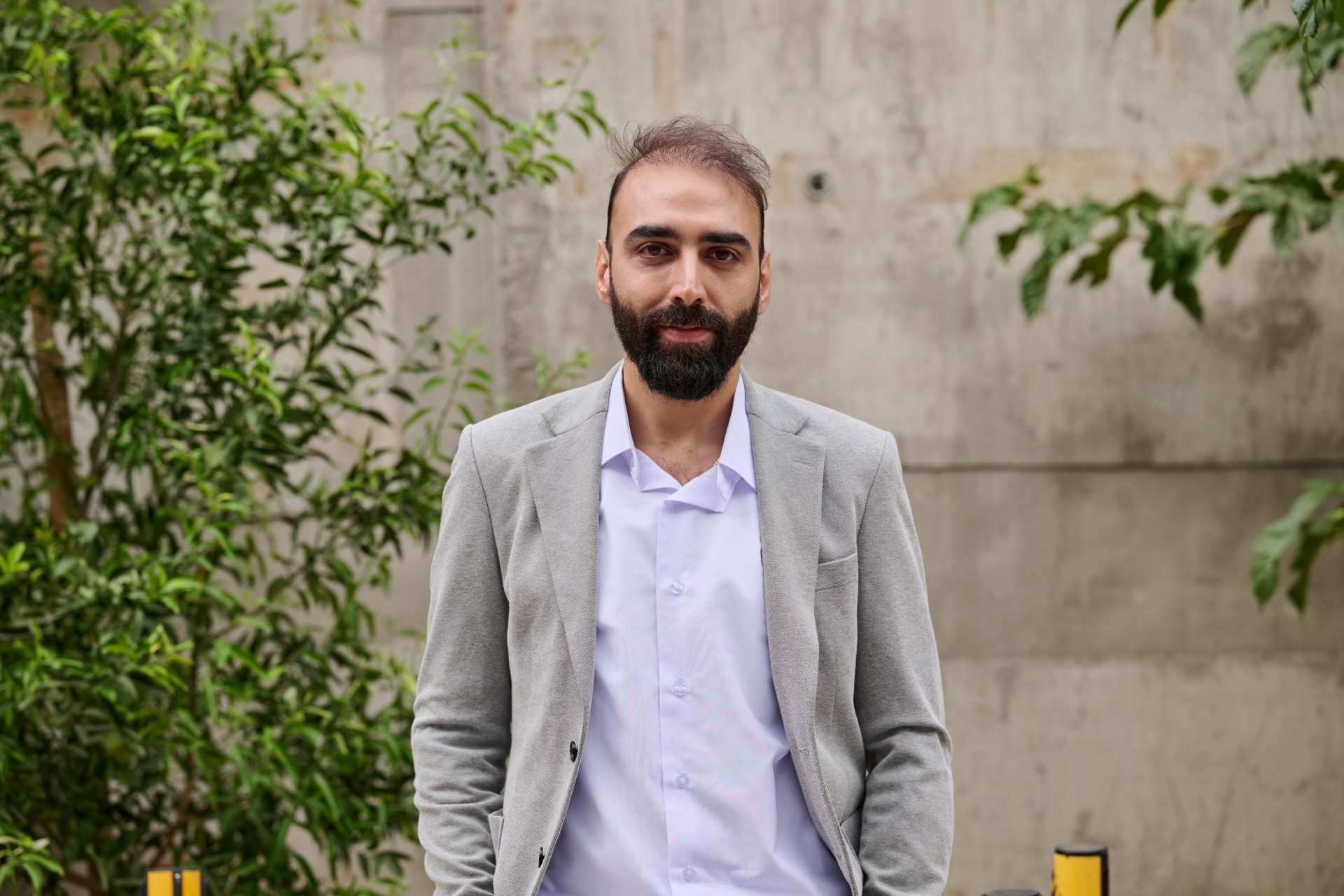
“We write in English for an audience all around the world. But we’re also grounded. We have people on the ground doing this work. We’re very involved. This is our life. We’re not writing about this from New York,” added Salama, who lives in Ramallah, West Bank. “These are our societies. These are our people, our stories, our lives. So we cannot be, you, know, objective. What we can do is be professional and fair,” Matar added.
We are the only binational magazine in Israel-Palestine. And we’re the only English-language magazine that has taken a clear stance since the beginning, even more so after the genocide.
Alaa Salama, Audience Engagement Manager of +972 Magazine
How does Israeli society react?
Matar and Salama both agree that Israeli society largely turned a blind eye to the events in Gaza over the past two years. “Most Israelis do not consider what is happening to be genocide,” Matar noted in Athens at the end of September.
Independent journalist Matthew Cassel expressed the same view when he spoke with Israelis in Tel Aviv about their perspective on the situation in Gaza for a recent Guardian report entitled “ ‘Our Genocide’: How do Israelis feel about the war in Gaza?”. “One poll in particular indicated that, I think, 76% of Israeli Jews do not consider any of the civilians in Gaza to be innocent,” he told iMEdD, explaining how the idea for this report came about. “What we found, by and large, was indifference. So, in line with the polls, we found a lot of indifference toward the suffering of Palestinians in Gaza. We also found a lot of Israelis who were supporting the government and the ongoing war.” Posted on YouTube on September 16, 2025, the video has received more than four million views in less than a month.
If you open Israeli media, for two years, every day there’s a story about October 7. Which makes sense, there are thousands of stories to be told. But at the same time [there is] no reporting on what is happening in Gaza. Or [there is] reporting on it in a very limited way, not through the eyes of Palestinians.
Haggai Matar, Executive Director of +972 Magazine
For the two of +972 Magazine, the country’s dominant media also play a key role in shaping public opinion in Israel. “The Israeli society consumes Israeli media and Israeli media is one-sided,” Salama noted. For his part, Matar believes that the media environment in Israel “has facilitated genocide.” “[If] you open Israeli media, for two years, every day there’s a story about October 7. Which again makes sense, there are thousands of stories to be told. But at the same time [there is] no reporting on what is happening in Gaza. Or [there is] reporting on it in a very limited way, not through the eyes of Palestinians,” he explains.
Haggai Matar said that the one-sided coverage of the issue continued during the first hours of the ceasefire. He explains that the Israeli media primarily covered the celebratory atmosphere surrounding the release of the Israeli hostages. “Unfortunately, very little is being said about the people of Gaza, what will happen to them and any long-term solutions,” he said on October 10.
Independent international coverage is nowhere to be found
Over the past twenty years Matthew Cassel has reported extensively on Israel and the Palestinian territories, and has been to Gaza itself many times. As of October 7, 2023, however, he has no access to the Palestinian enclave because Israel banned foreign journalists from entering without a military escort.
Israel’s official position is that this decision is based on security concerns for the journalists themselves. “I should be the one to determine whether or not it’s safe,” the American journalist told iMEdD during the International Journalism Forum in Athens.
On October 10, with the ceasefire in place, Cassel said, “To date, I have not seen anything that makes me optimistic that Gaza will open up to foreign journalists,” adding that he wants to be there immediately when this happens.
It should be noted that, according to a press release from the Foreign Press Association of Israel, the Israeli Supreme Court will consider lifting the entry ban on foreign journalists on October 23.
We’re not covering Gaza, I think, enough, given the magnitude of the situation.
Matthew Cassel, independent journalist
Cassel believes that the international media bear too much responsibility for their coverage of the situation, even if they have not yet gained independent access to Gaza. “We’re not covering Gaza, I think, enough, given the magnitude of the situation,” he told iMEdD.
ARIJ’s Rawan Damen shares the same view towards international reporting. She said that they feel “betrayed” by the coverage the situation in Gaza is receiving: “We were raised to believe that the Western media would be objective, would be ethical. [However], most of the mainstream Western media did not cover the story properly.”
One of the winning investigations at this year’s IJ4EU Impact Awards, presented on September 26 at the annual “UNCOVERED” conference and the iMEdD International Journalism Forum in Athens, was The Gaza Project –a collaborative investigation by more than 50 journalists and 18 media outlets, coordinated by the international journalism network Forbidden Stories.
“The goal was to investigate the pattern behind the killings [of journalists], to identify if there were some kind of such pattern from the IDF, the Israeli Defense Forces, and to investigate that killing as well as the targeting of newsroom infrastructure on the Gaza Strip,” Forbidden Stories executive director Laurent Richard told iMEdD.
The international team included journalists from ARIJ, +972 Magazine, The Guardian, Paper Trail Media, Le Monde and Agence France-Presse. Contributors included journalists from Palestine, Israel, France, Germany, Great Britain, and other countries.
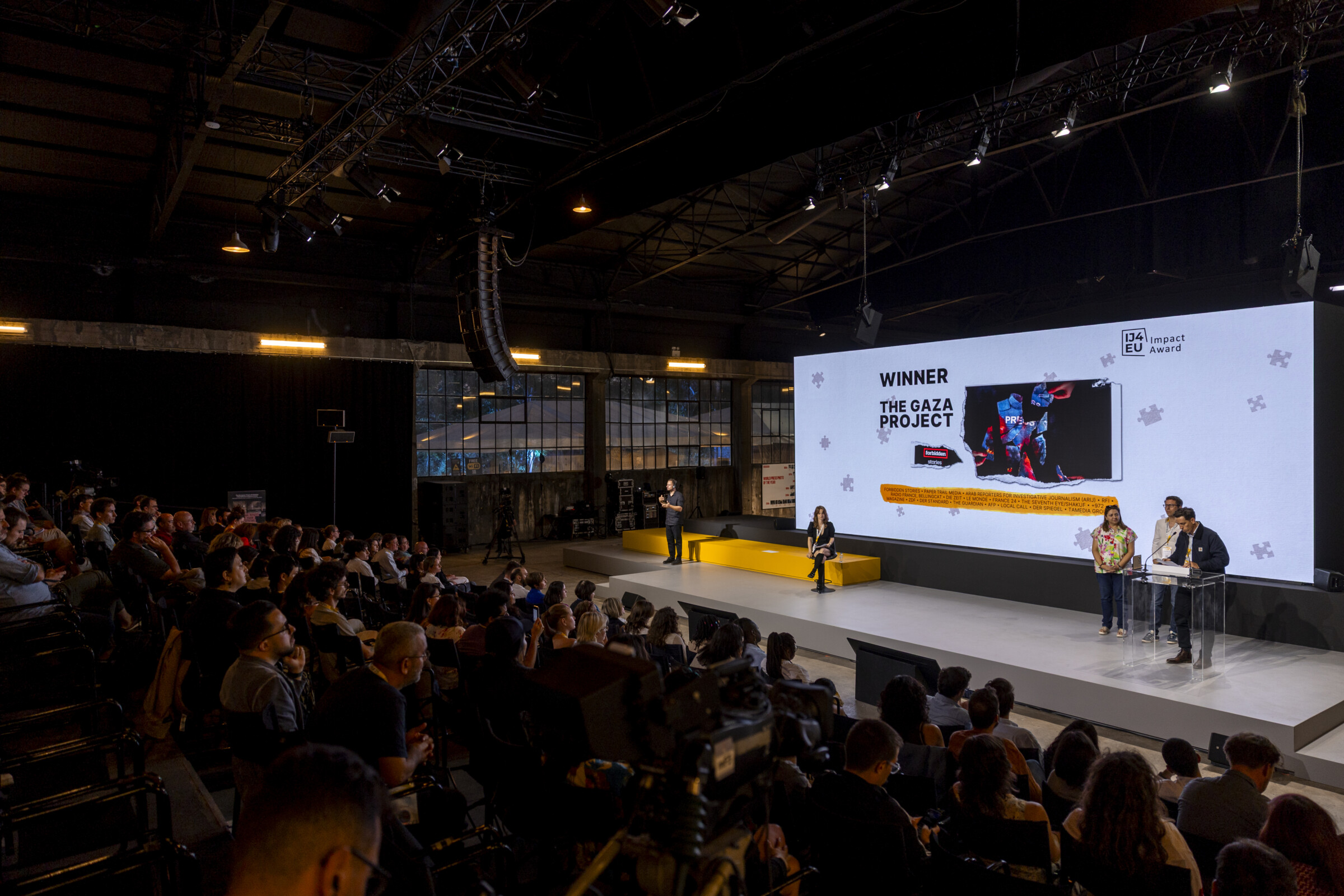
The investigation revealed that even journalists who had been identified as such by the IDF were targeted and killed. In fact, this was often preceded by a misinformation campaign in which Israel spread intelligence suggesting that these journalists were terrorists with links to Hamas –it should be noted that, according to the Geneva Convention, journalists are protected as civilians in times of war. Israel has repeatedly denied deliberately targeting journalists.
“We are facing a huge risk: the normalization of journalist deaths in our societies,” Richard said when he received the IJ4EU Impact Award. And Rawan Damen of ARIJ told iMEdD: “If you allow one country, one state, to do this genocide, another state and another country will do it somewhere else. This is why we shouldn’t allow this to continue. Because if we allow this to continue, it means that any journalist, anywhere in the world, can be a target.”
